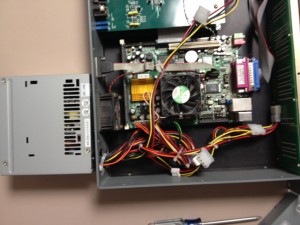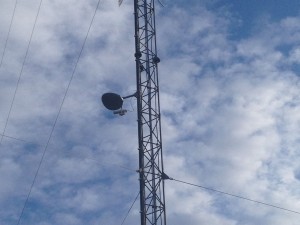UPDATE-I was able to visit the site Thursday morning, and found a problem with the receiver that picks up KOLU on 90.1 that was turning the transmitter on and off. Changing a control wire fixed the problem. Thank you for your patience.
Older Post: I f you listen to our translator on 92.3 in Prosser, you’ve undoubtedly noticed a noisy and intermittent signal. We have an engineer visiting the site the night of Wednesday, March 6 to troubleshoot the situation. If he is unable to fix the problem, Chief Engineer Martin Gibbs will visit the site Thursday morning.
In the meantime, if possible, you can listen on the web right here at kolu.com. We’ll work to fix the problem as soon as we can, and update you as to the status of the Christian Family Radio translator in Prosser, and have it back to a clear signal as soon as possible.
Thank you for your prayers, concern and support.
We will be working on our automation computers at the studio from 2 to 4 PM on Friday, February 22, installing a new router that will help to isolate the computers that keep Christian Family Radio on the air from the rest of our offices. We may not be able to air all our regular programming during this time.
Please note that streaming will not be functioning during certain portions of this time period.
This installation will ultimately help keep us on the air 24 hours a day, with problems that sometimes happen on the office network less likely to take our computers off line.
We appreciate your support of KOLU Christian Family Radio.
We’d like to apologize to our listeners for the loss of much of our Saturday morning programming today.
Nearly all the sound you here on KOLU comes from a “trio” of computers that must communicate with each other to operate properly. Occasionally, the link between the computer that is the “master controller” and the one that provides the sound stops working.
When this first happened, I was busy tending to another station that is in addition to my Christian Family Radio responsibilities. Available staff tried resetting both computers, but the reset sequence did not properly bring things back to normal. When I did have a chance to tend to the problem, we fully reset both computers and restored normal programming around 11:20.
This is a rare but occasional problem that would be difficult to completely fix due to fact that it doesn’t happen very often. We appreciate your patience and understanding.
If you read my post last month, “Of Windstorms, Processors and Dishes”, you may have wondered what the big deal about “hoar frost” was when it comes to radio stations. In light of the three power outages we had this past week, I figured it was time to expound on that thought a bit more.
At around 11:45 Sunday night while I was enjoying a restful sleep, my phone vibrated with a text message from our transmitter monitoring software alerting me that the power at our main transmitter site on Beck Mountain south of Kennewick had just gone out.
Now, as an aside, when this happens, our “backup” transmitter automatically comes on, running on batteries at low power (100 watts instead of 4100 watts), but keeping us on the air with a signal that is adequate for many of our listeners. This backup will run about 5 hours, normally enough time for power to be restored.
Rising from bed, I made a few quick checks on the readings through my computer at home, and then called Benton PUD to report the outage. After reaching the call center that covers overnight outages, I described our location and was assured that a crew would be investigating shortly. That was all I could do for now, so it was back to bed for me with a plan to check on things in the morning.
Looking over the logs Monday morning, I noted that power was restored around 2:00 AM and everything appeared to be back to normal, except for the reading we see during much of the winter that ice was built up on our antenna
Another aside here, the antenna we use was chosen because it can keep on broadcasting even with a lot of ice on it. It has indeed performed very well under those conditions, as years of service have proven.
This Monday was a work-at-home day, so I was refining some software we use on our network while the radio was playing. All appeared normal until around 7:40 when a sudden burst of static on my radio followed by a return of a “noisier” signal told my what I would find out by text message in a couple of minutes…power was off again.
Another call to Benton PUD confirmed that they were working with power lines that had heavy loads of ice. I know that lots of ice could build up enough to break the power lines, as we had experienced a few years ago. With a few questions for the dispatcher, I learned that it was indeed icing that was causing the problems. However, it was more likely that it was just causing the lines to “fault” (or short), rather than breaking them.
Once again, the PUD had us back to full power at 11:45 that morning, and all was well again.
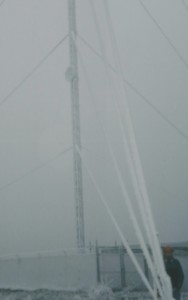 Wednesday night, just before the 7:30 live broadcast from Riverview Baptist Church, I was in the studio and had the same indications of a loss of power, which I promptly confirmed. This time, though, it was much more widespread, affecting not only our site on Beck Mountain, but also TV and radio stations on Jump-Off Joe. Noting my fellow broadcast engineers in this area were working on it, I was again resigned to wait until power could be restored. This time, it took longer than the 5 hours our backup was designed to run; we were completely off the air just after midnight. Power was restored at around 2:15 and has been on continuously as I write this.
Wednesday night, just before the 7:30 live broadcast from Riverview Baptist Church, I was in the studio and had the same indications of a loss of power, which I promptly confirmed. This time, though, it was much more widespread, affecting not only our site on Beck Mountain, but also TV and radio stations on Jump-Off Joe. Noting my fellow broadcast engineers in this area were working on it, I was again resigned to wait until power could be restored. This time, it took longer than the 5 hours our backup was designed to run; we were completely off the air just after midnight. Power was restored at around 2:15 and has been on continuously as I write this.
Now, how can we get so much ice here in the Tri-Cities to cause problems like this? After all, this isn’t Alaska or some far-north place where hundreds of inches of snow are falling…
This was a lesson I learned when we first expanded to Beck Mountain in 1995. That fog with freezing temperatures we frequently experience becomes even worse at the elevations in the hills above the Tri-Cities. What happens is that the droplets forming the fog are still liquid, while the power lines, tower, etc are just below freezing. These are called “supercooled” droplets, a condition well known to pilots whose airplanes become covered with what is known as “rime ice” rapidly in the same conditions. Each droplet that strikes a sub-freezing structure instantly freezes, building up over time. Compared with aircraft, ice builds up very slowly in the under-5 mph winds that accompany the fog, but over time huge amounts of the stuff accumulate. This ice is often called “hoar frost” but the name “rime icing” is actually a more accurate description.
I’ve posted a picture taken in 2004 just outside the gate of our tower. The ice buildup is so heavy that the guy wires are sagging under the load and the antennas on the tower look like they are growing beards! Indeed, ice in the Tri-Cities can be a very big issue when it comes to power lines, towers and transmitters!
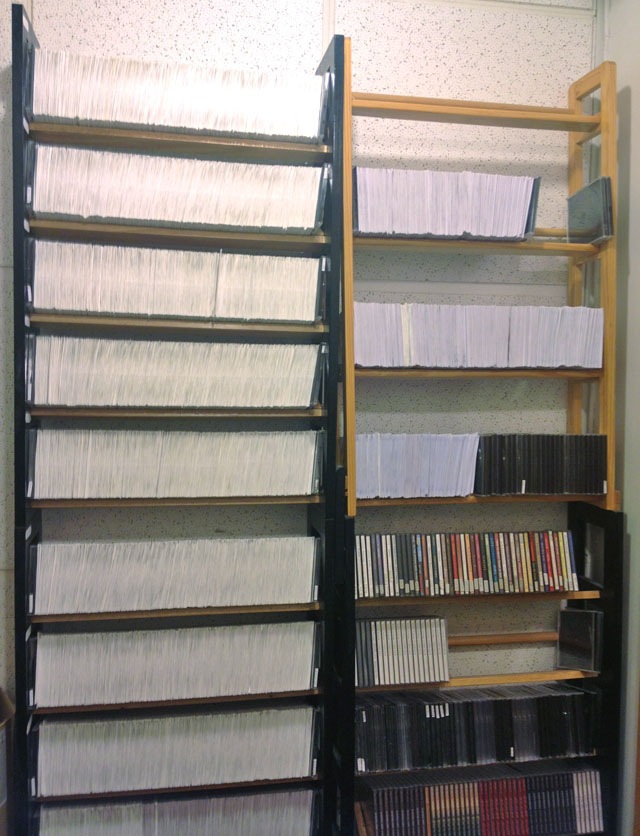
Certainly, if we just use the term “music” loosely, there is an abundance of new material being introduced every day. If we narrow the definition to “Christian” music, there remains an incredible selection of sounds. But, when we look for music that fits what we believe is the right music to play, available choices become scarce.
This leaves us with two main sources of music: “Classic” music from the days when the majority of Christians held to the musical values we do, and new music from Bible colleges, missionaries and churches and a few other ministries that believe the way we do.
Christian Family Radio has been around over 40 years now, and that has left us with a library that includes a large number of “classic” Christian songs. In fact, many of these songs are still being aired on Christian Family Radio. But, hearing the same songs all the time would “wear them out”, so sources of new music are vital.
We feel that we have been blessed with some good sources that have a lot of fresh, new music that adheres to both biblical standards and standards we believe are Christ-honoring.
We still have several sources of new music. Leading providers are Faith Music Missions of Evansville, Indiana, and Majesty Music of Greenville, South Carolina. Another source that sells but doesn’t produce music is the Old Fashioned Christian Radio Music Store of Grand Prairie, Texas. Also, Sacred Music Services of Greenville, South Carolina has some really good offerings. We invite you to explore each of these ministries’ offerings to add to your personal music collection.
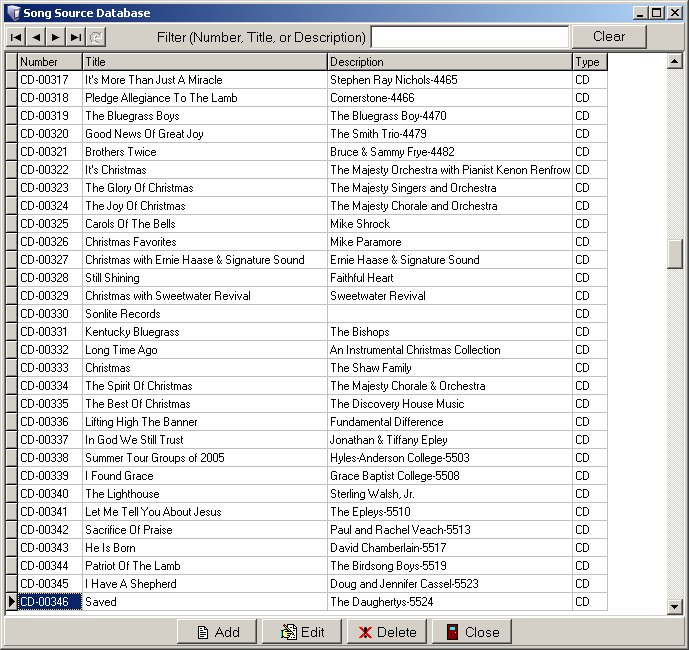 One thing that must be remembered is there is not a lot of demand in this present world for the kind of music we play. Most of our artists do not make much, if any, money from sales of their recordings. In turn, this leads to the necessity of saving costs when producing the songs, which means it’s unlikely you’ll find many new recordings that include a 100-piece live orchestra. Many of the musicians either do the work part-time or as part of their college education. Either way, we must work extra-hard to find those recordings that are done well before we place them on the air, and that means that there are a lot that do not “make the cut”, yet we are still able to find many good songs for you to enjoy.
One thing that must be remembered is there is not a lot of demand in this present world for the kind of music we play. Most of our artists do not make much, if any, money from sales of their recordings. In turn, this leads to the necessity of saving costs when producing the songs, which means it’s unlikely you’ll find many new recordings that include a 100-piece live orchestra. Many of the musicians either do the work part-time or as part of their college education. Either way, we must work extra-hard to find those recordings that are done well before we place them on the air, and that means that there are a lot that do not “make the cut”, yet we are still able to find many good songs for you to enjoy.
We hope you agree with us that this results in a steady stream of godly, uplifting, enjoyable music for you and your family to listen to on this station. As always, we invite your comments and suggestions.
 Even with the wide range of family-oriented Christian programming on this station, music becomes the “glue” that holds our programs together. That’s why one of the greatest continuing efforts we make here at Christian Family Radio is to constantly bring new, fresh and Christ-honoring music for you to enjoy.
Even with the wide range of family-oriented Christian programming on this station, music becomes the “glue” that holds our programs together. That’s why one of the greatest continuing efforts we make here at Christian Family Radio is to constantly bring new, fresh and Christ-honoring music for you to enjoy.
I was looking over our records of music on Christian Family Radio for the last year. We added 352 new songs to our library, with 53 of them especially for Christmas. This brings our total library of music to 4450 songs!
Adding music to our system is much more than simply recording a CD. First, we do our best to maintain a standard of quality for what we play. And, since we try to play certain music at certain times of the day or days of the week, it must be carefully classified to make sure it plays when we want it to. In all, each song is classified in 8 different categories, in addition to title, project (“album”) and source information. This is a lot of work that my wife Ruth has been doing an admirable job on for many years.
When it comes time to select a song to play over Christian Family Radio, we have programmed our computer system to use a “template” based on what day and time we are playing the music. The computer is also trying not to play one artist too often, and to “mix up” styles of songs and the types of groups (soloist, quartet, instrumental, etc) to add variety. This is a complicated process that is a chore the computer does well, that is, most of the time!
The result is that you’ll hear faster, more up-tempo music earlier in the day, and the more soothing, slower songs, including dedicated instrumental times at night. Sunday mornings are filled with choral music and hymns, a particular favorite of Manager Dr. John Paisley. All this is done without someone sitting down and choosing individual songs to play.
Remember you can search and browse through our music on our music page. We hope you enjoy the music you hear on Christian Family Radio, but are always open to comments and suggestions. Feel free to let us know what you think!
Those of us in the Columbia Basin remember well Monday, December 17. Those peak gusts hit at about 5am, the usual time for my morning workout at our local gym. I had a feeling there would be some extra tasks for me that day when the wind nearly pulled me out of my car.
While homeowners fret about trees and shingles, a broadcast engineer thinks towers, antennas and computers. Sure enough, at about 5:10, the gym lost half its power. The lady two treadmills down from me had to stop her walk, but mine kept on going meaning that the jogging would have to continue, much to my dismay.
At that same time, our studio lost power, taking us off the air. This would not normally happen, but the backup system was bypassed as we were having reliability problems with it. Although it was Monday, and getting near time for me to be at my other job, I stopped by and restored backup power, getting Christian Family Radio back on the air.
I went to work at the regular time, only to receive a call from one of our operators that the station would go “from static to sound, then back again”. During my break, I went out to my car and listened for myself. Sure enough, the signal (and “stereo” light) would come and go. These symptoms were not what I would have expected, so he managed to trace the problem with my help over the phone to that “thing with all the lights”, which I knew to be our audio processor.
Now, an audio processor is not at all like a food processor. Its job is to take the sound from the studio and “prepare” it for broadcast by keeping the level loud but clean, and adding the extra things necessary to give you a nice stereo signal. (Hmm…maybe it is like a food processor…). Anyway, it was deciding to go on strike every 20 seconds or so, and pretty much prevented us from broadcasting anything that made sense. So, I instructed the operator to remove us from the air, and wait for me to get off work early to see if there was any way to repair it.
Stopping by around 4pm, I turned the processor back on and listened. We got about 20 minutes of signal before the off-on-off sequence started. I removed the processor, bypassing it with a much worse, but listenable signal on the air. About that time “Cow Bell Bob” Sutton (host of Rise and Shine) arrived to see if he could help, and I was glad to have the company.
Putting the processor on the bench, it became obvious that the power supply (this gives electricity to everything else in the box) was having a problem. A call to the manufacturer confirmed the issue, and he made a comment that if I tried another power supply that they had a “special” circuit on theirs to turn it on…
Now, most power supplies are pretty specialized and finding something in the Tri-Cities to replace this one at 4:30 on a Monday evening was a tall order. I whispered a prayer and took a closer look at the inside of the box with the cover off, and then looked a bit closer. Then the thought hit me…this was a computer! Not unlike the many PC’s I maintain. The connector from the power supply was the same that is inside a PC. I quickly ran down the hall and pulled one of our spare PC power supplies off the shelf to give it a try. I plugged the wires together and plugged it in the wall, turning on the switch on the back. Nothing…
Then I realized that this box was missing what just about every PC has…a power switch.! A quick Internet search turned up a wiring diagram for this ubiquitous device, and some experimentation proved that a simple jumper between two wires would take care of the problem. A bit of soldering and we now had all those “blinky lights” again! By now, my wife showed up with dinner, relieving Bob of his assistant status, and with chili and cornbread to make the evening a bit easier.
Securing the (huge) supply to the back of the unit, all was put back together and placed back on the air, and we returned to normal operation, thanking the Lord for the wisdom he had given us.
It’s huge but it works!
Fast forward to today, with a box of shiny new parts, including the replacement for the power supply, along with some other items that I or the manufacturer felt needed replacement. My estimate of one hour off the air turned into an extra 15 minutes when I realized that 4 little recommended parts known as capacitors would be difficult to replace, taking most of the time. But, I figured this was the “ounce of prevention” we needed to keep us from having another time where the processor decides to “go on strike”…
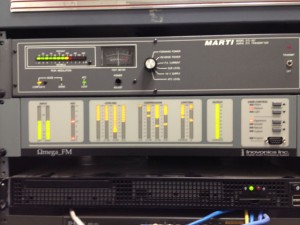
We like “Blinky” lights!
One Item Succumbs to the Wind
During the time I was occupied repairing the processor after the windstorm, I noticed that our computer communication with our main transmitter site on Beck Mountain in the Horse Heaven hills was not working. Getting a good night’s sleep, I arranged for Bob to cover my time on the air Tuesday morning. My middle son agreed to ride “shotgun” with me to the transmitter site, and I was sure to throw in the tower climbing safety gear in case the problem was found to be on the tower.
Sure enough, as we drove up to the site, I declared “well, I see the problem” as we viewed our dish that handles the computer signal pointing at the ground, rather than at the studio. After climbing up 40 feet with the right tools in my belt, the dish was straightened and computers were happily talking to each other again. The new down coat, winter cap and gloves sure came in handy with winds around 20 and the temperature near freezing.
“Well, I see the problem!”
It was amazing that this was the only damage at our site, which one TV station reported likely experienced winds over 100 miles per hour. (Note: the dish is supposed to be rated to 120!) I’m thankful for the sage advice we were given when we erected this tower in 1995, to “overbuild” it. I’ve since heard from others experienced in the business that it is indeed a very sturdy tower.
So, winter is here, and the famed Tri-Cities wind has taken its toll on all of us. Did I tell you that my biggest concern for our transmitter is not wind, but “hoar frost”? We’ll save that story for another time…
After months of behind-the-scenes work, we are finally able to debut Christian Family Radio’s new website! Our goal is to make it more up-to-date and with information you can use.
To that end, we have spent a lot of time preparing our information, or “databases”, to enable you to access information about the programming on Christian Family Radio.
A modern radio station’s operation revolves around computers, which are tasked with keeping the station on the air, but not necessarily to provide the listener with information in a form he or she might find useful. So, before we could provide this information, we had to write software to “translate” the information into something that would be more useful.
Since KOLU’s automation software is “in house”, that is, designed and maintained by yours truly, we had to first upgrade this software to place the information in more modern databases to make it more accessible. Once that was complete, the next task was writing more software to reformat this information and place it on the web.
Finally, we were able to design the web site itself, which involved a steep “learning curve” on newer web technologies, including WordPress, on which this site is based.
We still have much information to add to provide the information we’d like to have available to you. Feel free to use one of our forms for your comments and questions.
We hope you will enjoy browsing this site and continue to listen to Christian Family Radio. May the Lord bless you indeed!

